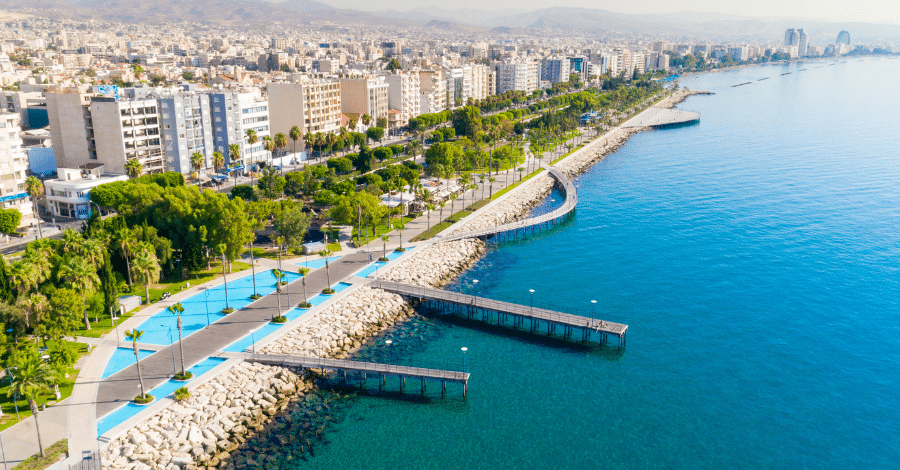For many years, Cyprus has been popular with English-speaking expats, both as the perfect place to enjoy their retirement and, in the last 15 years, for singles and families seeking a really good work-life balance.
Cyprus is a stunning island with gorgeous beaches, private coves, and dramatic rocky headlands. Inland, there is a fast-changing landscape with numerous pretty villages where life has changed little in generations.
The climate in Cyprus is very attractive, with a very brief winter, rainy February and March, followed by warm sunny weather from April onwards through to December. There are plenty of locally grown fruits and vegetables that are seasonally available, and the island produces excellent wines and beers. The Cypriots are kind and warm-hearted, and will make you feel very welcome.
Since 1974 and the Turkish invasion, the island of Cyprus has been divided in two. In this article, we talk about the south of the island – the Republic of Cyprus, a European Union member, – which offers English-speaking expats a wonderful quality of life in a safe environment with excellent food and drink.
A real plus factor for choosing to move to Cyprus is that the road system, postal system, and much of the country’s infrastructure are based on the British system, as the island was a British colony for many years until 1960.
1. Nicosia (Lefkosia)
Nicosia is the capital of Cyprus and is the only divided capital city in the world. Situated inland in the center of the Mesaoria Plain, Southern Nicosia (Republic of Cyprus) is a lively and vibrant city and the cultural focus of the country. The city is also the financial hub and home to the impressive Cyprus Museum and others.

Also known as Lefkosia, the city is divided by the ‘Green Line’ which is patrolled by UN soldiers. It is possible to cross to the north of the city, and there are some interesting places to visit there, including Selimiye Camii Mosque, Büyük Han, and the Armenian Church and convent.
There is plenty to see and do in Nicosia for English-speaking expats as it has excellent shops and restaurants. English is widely spoken, especially by younger Cypriots. If you are moving to Nicosia with your family, the city’s English School has an excellent reputation, and there is also the American Academy and American International School. Since 1974, Nicosia airport has not been in use, so the closest international airport is situated in Larnaca, which takes about 50 minutes.

In the center of the city, most of the accommodation is in modern apartments, but a little further out, there are all types of houses to rent. Nicosia has good bus services, but there is no train service on the island.
If you want to travel from Nicosia to another city, a shared taxi is a cheap option. A real bonus for English speakers living in Nicosia is that Nicosians speak the clearest Greek, which makes it easier to understand when you’re a beginner at learning the language. Health facilities in the capital are excellent, with both a new general hospital and several excellent private clinics.
2. Limassol (Lemessos)
Situated on the island’s south coast, Limassol is large and sprawling with something for everyone. It is a popular holiday resort with luxury hotels strung along its seafront and overlooking the attractive Molos beach promenade. There are good beaches and a choice of water sports.

Limassol is also very much a working city with a huge port. Limassol is an IT focus and has many international shipping companies based there, as well as international financial companies. Limassol is a good choice for English-speaking expats as it is lively and contemporary, a melting pot of many different nationalities.

The city hosts are a number of events during the year, including its famous Wine Festival. If you are planning to move to Limassol as a family, there are five international schools, including the American Academy. A real plus factor is that in the winter, snow falls in the Troodos mountains, just one hour away, and there are facilities for downhill and cross-country skiing, plus snowboarding.
Accommodation in central Limassol is mainly in apartments – with high rents – but moving out to the suburbs such as Ypsonas, Kolossi, and Erimi gives you more choice and lower prices. There are numerous English-speaking clubs and associations for all ages and several free publications in English. For enjoyable mini-breaks, several Cypriot cruise companies offer short itineraries to the popular Greek Islands.
3. Paphos (Pafos)
Paphos is the largest district in Cyprus and is situated on its western coast. Besides the city itself, Paphos has numerous pretty hill villages and is the most popular choice for English-speaking expats moving to Cyprus, as it has a lovely climate, relaxed way of life, and stunning sunsets.

Paphos harbor is very picturesque and is a UNESCO World Heritage Site because of its large archaeological site with amazing Roman mosaics.
Paphos has great beaches, including Coral Bay, which is particularly popular. There are many activities and good water sports that appeal to families.
There is an International School in Paphos, although some families place their children in the local educational system, which is very good. Paphos is best suited to English-speaking expat couples planning to retire, as the job market is challenging, and most vacancies are linked to the tourist season.

Two villages that are particularly popular with English-speaking expats, situated on the fringes of the city, are Peyia and Tala.
Paphos does get really busy in the summer months and is the country’s only 12-month tourist destination. There are a number of expat community clubs to enjoy, including ones for specific activities such as bowls.
Notably, the healthcare in Paphos is excellent, with a number of English-speaking doctors. Traveling abroad from Paphos is easy, as the city has its own international airport.
4. Larnaca (Larnaka)
Although Larnaca used to be the island’s capital, today it is a much smaller city, and because it has the largest airport, it tends to be the first glimpse of Cyprus for many visitors. Situated on the southeastern coast of the island, Larnaca city center is small enough to walk around easily.

The city is known for the beautiful church of Ayios Lazarus and its famous salt lake where thousands of flamingos stop in the winter each year. There is easy access to other parts of the island using the national highway, and there is a good bus service within Larnaca.
If you are an English-speaking expat planning to move to Larnaca, it is becoming an increasingly popular retirement destination. If you are hoping to work, most jobs are seasonal and in the tourist industry. If you are relocating as a family, the American Academy has a junior and senior school in the city.

Within easy reach of the city, there are a number of attractive new builds in such areas as the fishing villages of Mazatos and Zygi.

The Phinikoudes beach on the edge of the city center is the best-known beach, and there are water sports to enjoy, including good diving, as the wreck of the Zenobia (one of the world’s top ten dive sites) lies 4.5 km from the coast.
5. Other towns in Cyprus
While these are the main cities in Cyprus, there are a number of towns that also appeal to English-speaking expats moving to Cyprus. On the northwest coast, about 40 minutes drive from Paphos is the historic town of Polis Chrysochou – so called as it overlooks the beautiful Chrysochou bay. This is a lovely part of Cyprus, as it is slower and quieter, and time is marked by the passing seasons.

Like its neighbor, the fishing harbor of Latchi, it is a good choice for retirees, with a good choice of small, modern easy to maintain properties, but shops and medical facilities are limited.

At the other end of the island, east of Larnaca, lie Paralimni and Ayia Napa. Both are popular holiday destinations and do get quite busy during the summer season, but by October, they are really quiet. Again, they appeal to those seeking a relaxed way of life with stunning weather and beaches. In recent years, they have both been appealing to an increasing number of digital nomads – and it is easy to see why.

